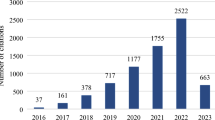Abstract
Search algorithms are often compared by the optimization speed achieved on some sets of cost functions. Here some properties of algorithms’ optimization speed are introduced and discussed. In particular, we show that determining whether a set of cost functions F admits a search algorithm having given optimization speed is an NP-complete problem. Further, we derive an explicit formula to calculate the best achievable optimization speed when F is closed under permutation. Finally, we show that the optimization speed achieved by some well-know optimization techniques can be much worse than the best theoretical value, at least on some sets of optimization benchmarks.



Similar content being viewed by others
References
Aarts E, Korst J (1989) Simulated annealing and Boltzmann machines: a stochastic approach to combinatorial optimization and neural computing. Wiley, New York
Altenberg L (1997) Nk fitness landscapes. In: Back T, et al. (eds) Handbook of evolutionary computation. IOP Publishing Ltd and Oxford University Press, Bristol, pp B2.7:5–B2.7:10
Deb K, Goldberg DE (1993) Analyzing deception in trap functions. In: Whitley D (ed) Foundations of genetic algorithms, vol 2. Morgan Kaufmann, San Mateo, pp 93–108
English TM (2004) On the structure of sequential search: beyond “no free lunch”. In: Gottlieb J, Raidl GR (eds) EvoCOP. Lecture notes in computer science, vol 3004. Springer, Berlin, pp 95–103
Goldberg DE (1989) Genetic algorithms in search, optimization and machine learning. Addison-Wesley, Reading
Häggström O (2006) Intelligent design and the nfl theorems. Biol Philos 22(2):217–230
Holland JH (1975) Adaptation in natural and artificial systems. University of Michigan Press, Ann Arbor
Hyafil L, Rivest RL (1976) Constructing optimal binary decision trees is NP-complete. Inf Process Lett 5(1):15–17
Igel C, Toussaint M (2004) A no-free-lunch theorem for non-uniform distributions of target functions. J Math Model Algorithms 3(4):313–322
Jackson K, Kreinin A, Zhang W (2009) Randomization in the first hitting time problem. Stat Probab Lett 79(23):2422–2428. doi:10.1016/j.spl.2009.08.016
Radcliffe N, Surry PD (1995) Fundamental limitations on search algorithms: evolutionary computing in perspective. Lecture notes in computer science, vol 1000. Springer, Berlin, pp 275–291
Rowe JE, Vose MD, Wright AH (2009) Reinterpreting no free lunch. Evol Comput 17:117–129. DOI http://dx.doi.org/10.1162/evco.2009.17.1.117. URL http://dx.doi.org/10.1162/evco.2009.17.1.117
Schumacher C, Vose MD, Whitley LD (2001) The no free lunch and problem description length. In: Spector L, Goodman ED, Wu A, Langdon WB, Voigt HM, Gen M, Sen S, Dorigo M, Pezeshk S, Garzon MH, Burke E (eds) Proceedings of the genetic and evolutionary computation conference (GECCO-2001). Morgan Kaufmann, San Francisco, pp 565–570. URL cite-seer.ist.psu.edu/schumacher01no.html
Valsecchi A, Vanneschi L (2008) A study of some implications of the no free lunch theorem. In: Gi- acobini M, et al. (eds) International workshop on theoretical aspects in artificial evolution, EvoTheory 2008. Proceedings of applications of evolutionary computing, EvoWorkshops 2008. Lecture notes in computer science, vol 4974. Springer, Berlin, pp 633–642
Wolpert DH, Macready WG (1997) No free lunch theorems for optimization. IEEE Trans Evol Comput 1(1):67–82. URL citeseer.ist.psu.edu/wolpert96no.html
Author information
Authors and Affiliations
Corresponding author
Rights and permissions
About this article
Cite this article
Valsecchi, A., Vanneschi, L. & Mauri, G. A study of search algorithms’ optimization speed. J Comb Optim 27, 256–270 (2014). https://doi.org/10.1007/s10878-012-9514-7
Published:
Issue Date:
DOI: https://doi.org/10.1007/s10878-012-9514-7




